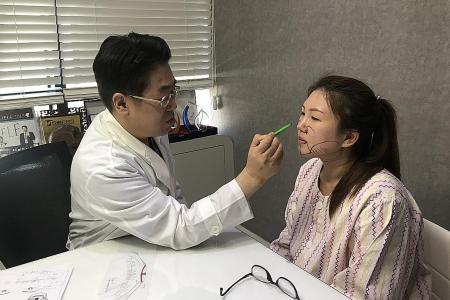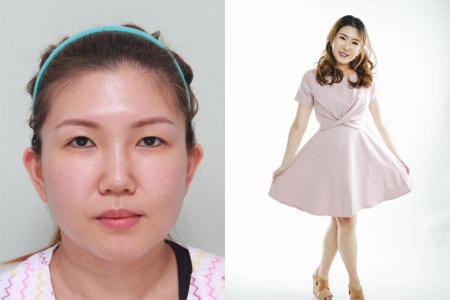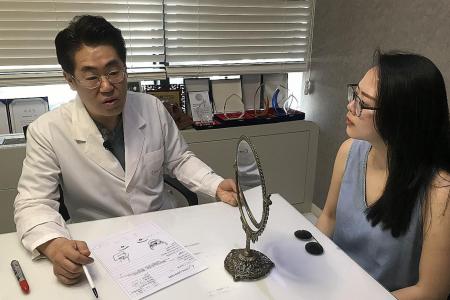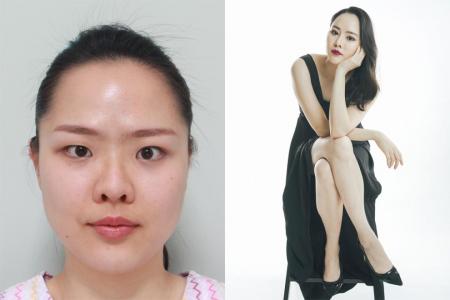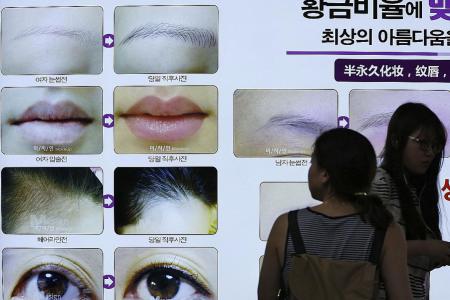Singapore women gain confidence after cosmetic surgery
With more Singaporeans heading to South Korea for plastic surgery, we document the before-and-after journey of two women who got multiple procedures to enhance their beauty
She had been teased for being plump since she was a young girl, leading her to lose more than 20kg over eight years.
After years of dieting, taking slimming pills, exercise and fluctuating weight, which saw her tip the scales at 68kg at her heaviest and 46kg at her lightest, Mrs Christine Kennedy still felt that more could be done to enhance her looks.
The 31-year-old customer solutions officer, who has no children, told The New Paper: "Even after all the effort I put into losing weight, I still find myself chubby on my face and tummy."
Describing her school days as lonely and difficult, she said children would call her "pui-fect" (pui is fat in Hokkien).
Mrs Kennedy, who previously had a double eyelid procedure done in Singapore and a nose thread lift in Johor Baru, said: "I found it hard to make friends when I was younger, and I felt that cosmetic surgery would help make me more confident.
"Most people tell me that I don't need (it), but those who have known me for a longer time understand my decision."
She was one of two winners of a contest organised by Eunogo - a company that provides a concierge service to foreigners visiting South Korea to undergo beauty and wellness procedures - who were flown to Seoul for two weeks in July for an all-expenses-paid trip to Gyalumhan Plastic Surgery clinic in Gangnam.
The other successful applicant was a bride-to-be who wanted to be known only as Sophia. The 28-year-old marketing executive will be tying the knot next month.
I found it hard to make friends when I was younger and I felt that cosmetic surgery would help make me more confident.Mrs Christine Kennedy
She told TNP in a separate interview: "I have always been open to plastic surgery as I feel it helps both men and women achieve their ideal looks. But the trigger was my wedding, which made me want to take the leap."
When asked if she was worried about an unfavourable outcome, Sophia said: "While the thought that something may go wrong was there, the confidence the doctors gave me did not let it become a deterrence."
Mrs Kennedy opted for jaw reduction and chin surgery, face suction, endoforehead lifting procedure and rhinoplasty, while Sophia underwent non-incision double eyelid surgery, face suction with thread lifts, endoforehead lifting procedure and rhinoplasty.
With the release of their post-surgery pictures three months later, both women were satisfied with the results.
Mrs Kennedy said: "I still have my original look but now it is an enhanced version. I did not expect to look totally different from previously anyway.
"Some people feel (I look) different, but they cannot tell exactly what it is that changed."
I have always been open to plastic surgery as I feel it helps both men and women achieve their ideal looks. But the trigger was my wedding, which made me want to take the leap.Sophia
Sophia said: "I wake up every day and look better and better than the day before.
"I knew I had a certain level of self-confidence but at the back of my mind, I felt like I was not very photogenic.
"But when I saw myself in the photos (from my wedding photo shoot last month), I felt they looked really beautiful."
FULFILLING
Describing her plastic surgery journey as a reflective and fulfilling one, she said: "As much as the topic itself sounds superficial, as an active participant of this whole experience, I learnt a lot about myself throughout.
"Going in, you need to have some sort of evaluation: Are you really up for it? Do you want to make this big change?
"And then during the recovery, it is a lot about staying positive, because it will take some time, and you just have to trust the process and the doctors."
Ms Joy Kang, the co-founder and chief executive officer of Eunogo, said the contest received 70 applicants over six days and comprised a stringent selection process.
They were required to fill a medical application form to assess if they were eligible for cosmetic surgery before being reviewed by doctors.
They were then interviewed about their motivations for wanting to undergo it.
Ms Kang told TNP: "We wanted to find out their stories and what they were after, to ensure that the successful applicants had positive, clear goals for wanting a makeover."
Founded in 2015 and licensed by the South Korean government, Eunogo provides a medical translator and works with a list of certified clinics as it understands the challenges that come with travelling to another country for beauty procedures.
Ms Kang said: "Some problems that foreigners may face include being overcharged or the medical credibility of doctors. So we want to provide assurance, transparency and easy communication between doctors and patients."
Plastic surgery trend in S. Korea: Becoming better version of oneself
Many years ago, top Korean actress Kim Tae-hee was the celebrity that many patients wanted to look like.
But times and trends have changed, with Korean aesthetic experts saying beauty ideals have become more personalised.
Dr Kim Nam Ho, one of the head surgeons and director of Gyalumhan Plastic Surgery, told The New Paper: "Ten to 20 years ago, Gangnam beauty was popular, whereby facial features mimicked foreigners.
"However, the trend now would be becoming a better version of oneself."
He added: "While there was a 'golden ratio' we followed, now we believe that different ratios have different expressions and images, like a sexier or cuter look.
"For example, a shorter chin would give one a cuter expression."
During Mrs Christine Kennedy's consultation, she described herself as bubbly to Dr Kim, so he decided to go for a cuter look and make her chin smaller.
The most common procedures that the clinic performs are on the eyelid and breast, and face contouring and rhinoplasty.
Dr Kim's clientele mostly hails from China and Thailand.
Singaporean patients, he said, have more fat on the face, so a popular request is liposuction. He described them as less demanding, polite and certain of the outcome they want to achieve, even more so than his local patients.
Dr Kim said: "Korea has become one of the leaders in cosmetic surgery because Korean women have a high standard of beauty, in addition to the advanced technology and trained skills of Korean surgeons, who have to undergo a longer period of training to be certified."
The Gangnam district has also become one of the most popular hot spots for plastic surgery in SouthKorea.
Out of the 600 clinics there, 367 specialise in cosmetic surgery, according to Ms Jena Kim, sub-head of the Gangnam Medical Tour Centre (GMTC).
The majority of foreign patients are from China, at 31 per cent, followed by Americans at 14 per cent, while South-east Asians make up less than 5 per cent.
The GMTC was set up to provide information to foreigners about the clinics in Gangnam, with a kiosk for visitors to search for clinics specialising in different procedures.
It provides free medical check-ups, skin analysis and weight measurement too.
However, some problems the authorities have faced include illegal brokers and shadow doctors.
Ms Kim said: "Illegal brokers connect patients with clinics and take them only to clinics that pay them.
"People can call the centre up if they know of any unlicensed brokers."
She explained that shadow doctors are trainees or less experienced doctors who perform procedures in place of doctors who are being consulted, and that the GMTC has launched many campaigns to deter this issue. - KIMBERLY LIM
Going overseas to get plastic surgery not always the best idea
Going overseas to get work done may not always be the best idea, say leading local plastic surgeons.
Dr Terence Goh, president of the Singapore Association of Plastic Surgeons and consultant plastic surgeon at Azataca Plastic Surgery, said that he has seen a 10 per cent increase in patients with complications or dissatisfaction after surgery overseas.
The most common reasons are miscommunication, a lack of follow-up from the doctors and lack of understanding of plastic surgery practices in the respective countries.
Dr Goh told The New Paper: "We are unable to ascertain the training requirements for the different countries and the adequacies of their facilities.
"Having had the opportunity to train and observe at international hospitals and clinics, my colleagues there have also mentioned to me that among (the clinics) and their peers, there is a wide range of facilities and skills (of practitioners), and regulations are not as stringent as one would imagine.
"These range from junior doctors that have little or no experience to senior doctors."
He warned of situations where surgery ends up being performed by a doctor with unknown qualifications.
He said: "To help keep the cost of surgery low, there have been instances where the main surgeon walks out of the surgery after the patient is anaesthetised, leaving an unknown surgeon to operate so that he can free himself for further consultations.
MONITOR
"Unlike in Singapore, it may not be easy to police and monitor all the facilities and ensure uniformity in safety standards and excellence.
"As in everything in life, you get what you pay for."
Dr Goh also stressed the importance of follow-ups with the surgeons.
He said: "Plastic surgery is not just about the operation. The journey to recovery is equally, if not more important, where patients have to deal with scars and discomfort.
"It is not uncommon for patients to return to Singapore soon after the surgery for removal of sutures as they are unable to stay the entire duration of their recovery.
"Sometimes, they can be stranded without a doctor to see for a follow-up."
Dr Leslie Kuek, former president of the Singapore Society of Cosmetic (Aesthetic) Surgeons and Singapore Association of Plastic Surgeons, recalled how he treated five patients as a result of complications from undergoing cosmetic surgery in Thailand and Korea, among other countries.
He told TNP: "Imagine if I were not comfortable speaking English, how do I explain the nuances and options to the patient, why it is not correct and what are the possibilities?"
He said that while a translator may reduce the language barrier, but "sometimes it cannot be helped if something gets missed out along the way".
He added: "People who go overseas have to deal with the potential problem of being unable to communicate with the doctor and vice versa.
"And if you see a doctor in another country, what recourse do you have if something happens when you get home?
"If you face issues post-surgery, you have to be willing to travel back again to get it checked out."
According to Dr Kuek, many patients also end up doing more procedures than planned when overseas after being persuaded by the doctors or agents.
He explained: "Then they regret it because they did not think it through and do not like the results."
Get The New Paper on your phone with the free TNP app. Download from the Apple App Store or Google Play Store now

